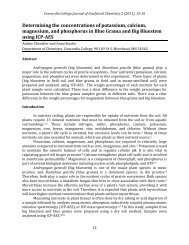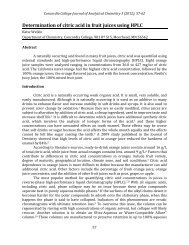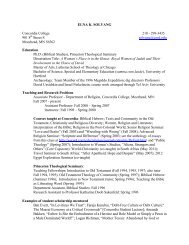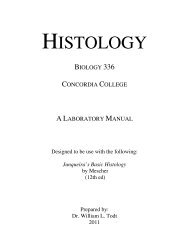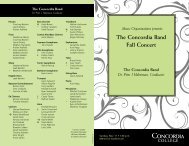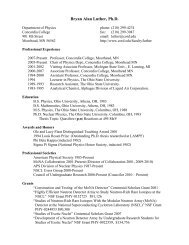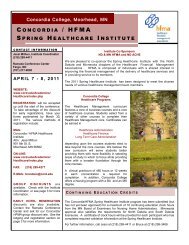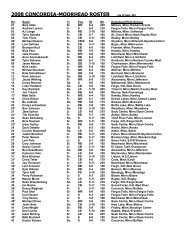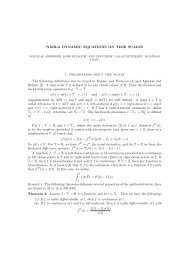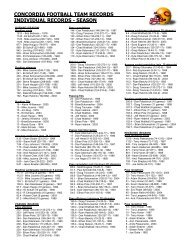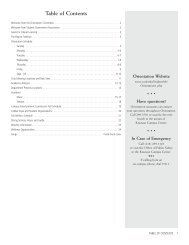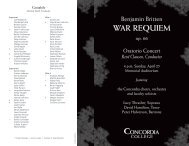Djembe - Concordia College
Djembe - Concordia College
Djembe - Concordia College
Create successful ePaper yourself
Turn your PDF publications into a flip-book with our unique Google optimized e-Paper software.
10<br />
fighting to bring back hope and create a new life, a journey that suggests universal and specific<br />
connections. Into the West focuses on the Reilly family, Travelers who have relocated to urban<br />
housing near Dublin airport following the death seven years earlier of Papa’s wife in childbirth that<br />
resulted in young Ossie. The difficulty of dealing with death and learning how to live sends Ossie<br />
(Ciarán Fitzgerald) and his older brother, Tito (Rúaidhrí Conroy), on a heroic journey. Philosopher<br />
Thomas Attig, an internationally recognized expert on death, dying and bereavement, emphasizes<br />
the difficulty involved: “Ordinarily, grieving involves nothing less complicated than relearning<br />
the world, including our physical and social surroundings, our place in the greater scheme of<br />
things, our selves, and our relationship with the one who has died” (7). When we consider how the<br />
children experience death and seek resurrection, the heroic purpose of the film becomes clear: the<br />
construction of identity as the children embrace the journey to self-responsibility and assurance,<br />
and the boon of helping heal their grieving parental figures.<br />
Ordinarily, when children experience the death of someone close to them, surviving<br />
parental figures are expected to help the children understand and cope. However, Papa Murphy is<br />
incapable of helping the children since he cannot cope with the death himself, but instead represses<br />
his painful memories and stumbles through life in a haze. Attig’s description of bereavement<br />
reflects exactly Papa’s experience:<br />
When we are bereaved, we suffer a shattering loss of wholeness. The patterns of<br />
connections to things, places, other people, experiences, activities, and projects in<br />
our daily lives are in tatters. Our individual, family, and community life histories<br />
are disrupted and cannot follow the courses we expected them to follow had our<br />
loved one lived. Line of connection to larger wholes and our sense of place in<br />
the larger scheme of things within which we find and make meaning are broken,<br />
undermined, or threatened. We feel undone, at a loss as to how to go on, anxious,<br />
insecure, unsafe, vulnerable. (10)<br />
Papa can no longer live as a Traveler and lead his former community in the way of<br />
life that he had shared with his dead wife. He retreats to the urban decay of government housing<br />
where he can bring up his two boys with at least some government support, the very kind of<br />
support denied to his wife when they were turned away from the hospital. Yet he is lost in this<br />
environment, a broken man who cannot find his way, much less make a way for his children.<br />
While Papa Reilly is prompting the children to scam the government man who has come to check<br />
on the large Murphy family, a family in dire need of assistance, the seriousness of what he says<br />
underlies the comedic scene: “I’m not your father. You understand me. The other man is your<br />
father” (Newell). Indeed, he isn’t behaving as the father or man he once was. While Ossie does<br />
not understand the comment on either level, having never known his father prior to his mother’s<br />
death at his own birth, his elder brother Tito knows only too well that the man he lives with now<br />
is not the father he once knew. Grandpa Ward (David Kelly) tells Papa, “You’re a fallen man.” He<br />
insists that he come back to the West, to the Old Ways, to which Papa responds “The old ways is<br />
dead.” The singular might be understood as a natural reflex of his class and lack of education, or it<br />
might also be directly connected to Papa’s understanding that the old way of life died when Mary<br />
died, that she and the Traveler way are one. He heads for the bar, turning his back on Grandpa and<br />
any hint of that old life that the old man carries.<br />
From the beginning, the theme of journey is visually created through a central symbol<br />
that metaphorically will gain power across the arc of the narrative. Into the West opens on a clear,<br />
dark night on the pristine sands of Dog Bay in Connemara, a lone, wild, white horse galloping<br />
across the surf. The midnight blue of the sky and sea and the gleaming white horse is stunning,<br />
with an extreme close-up on the horse’s eye giving us a sense of wild mystery, of being held in



